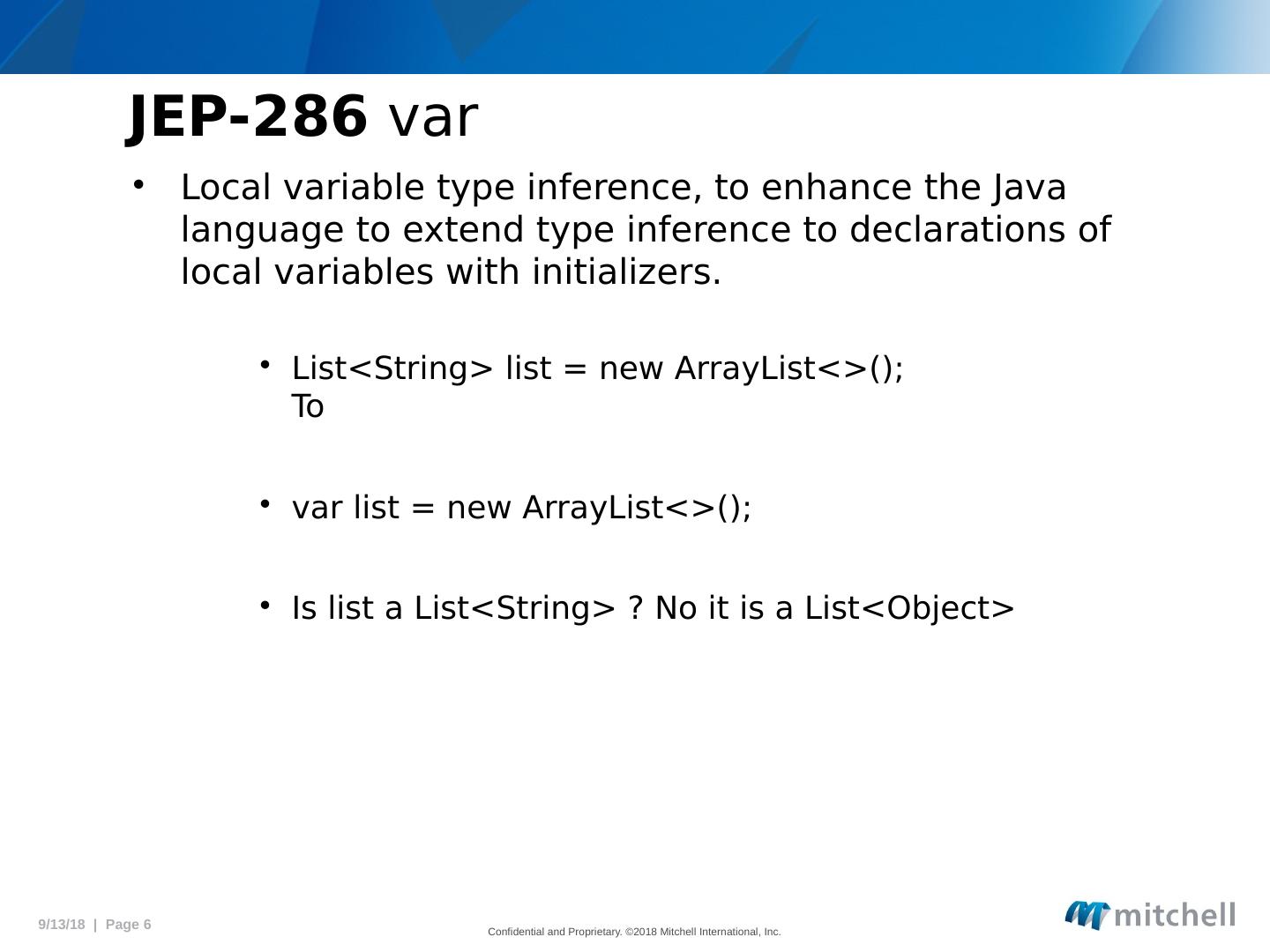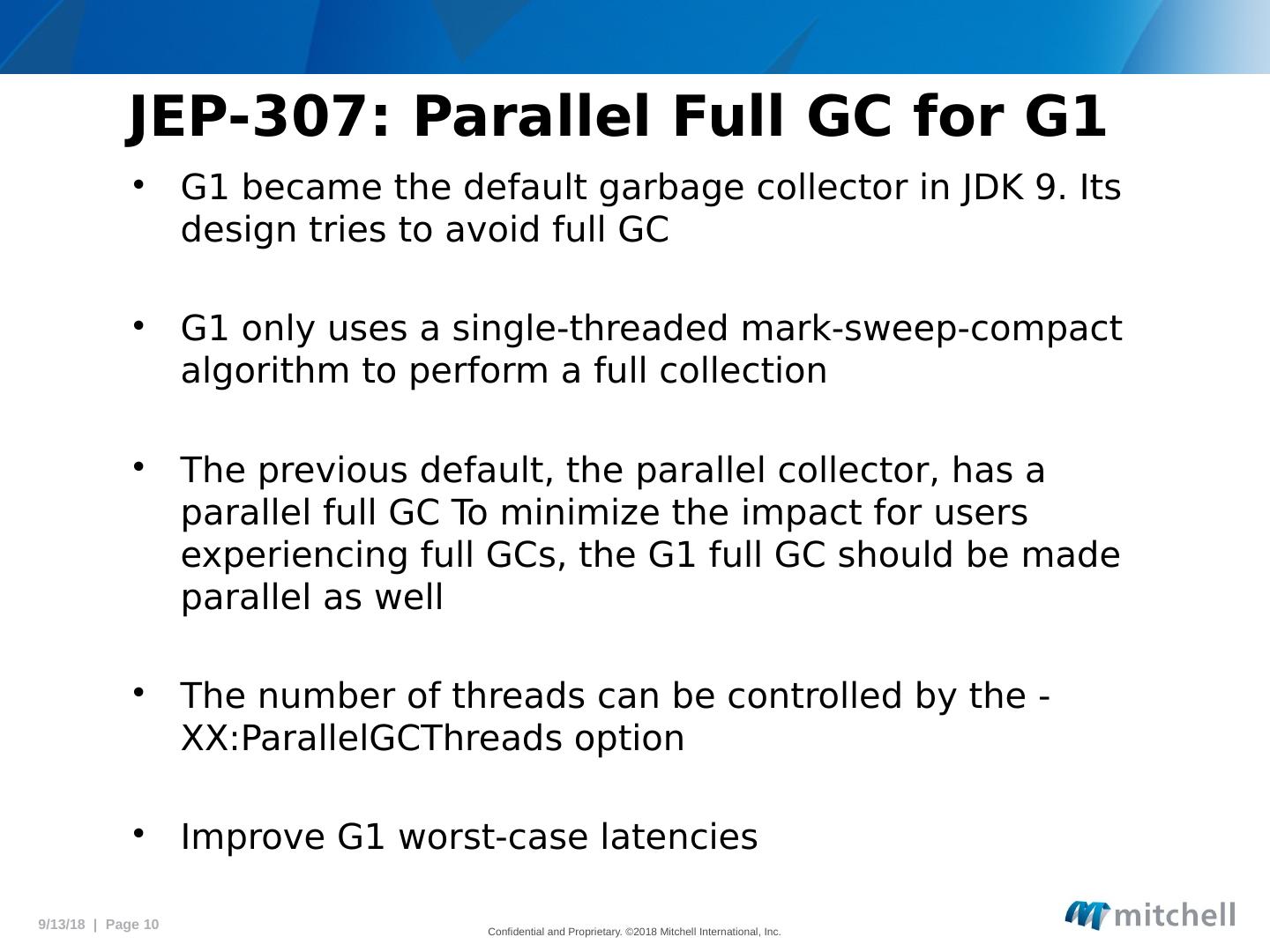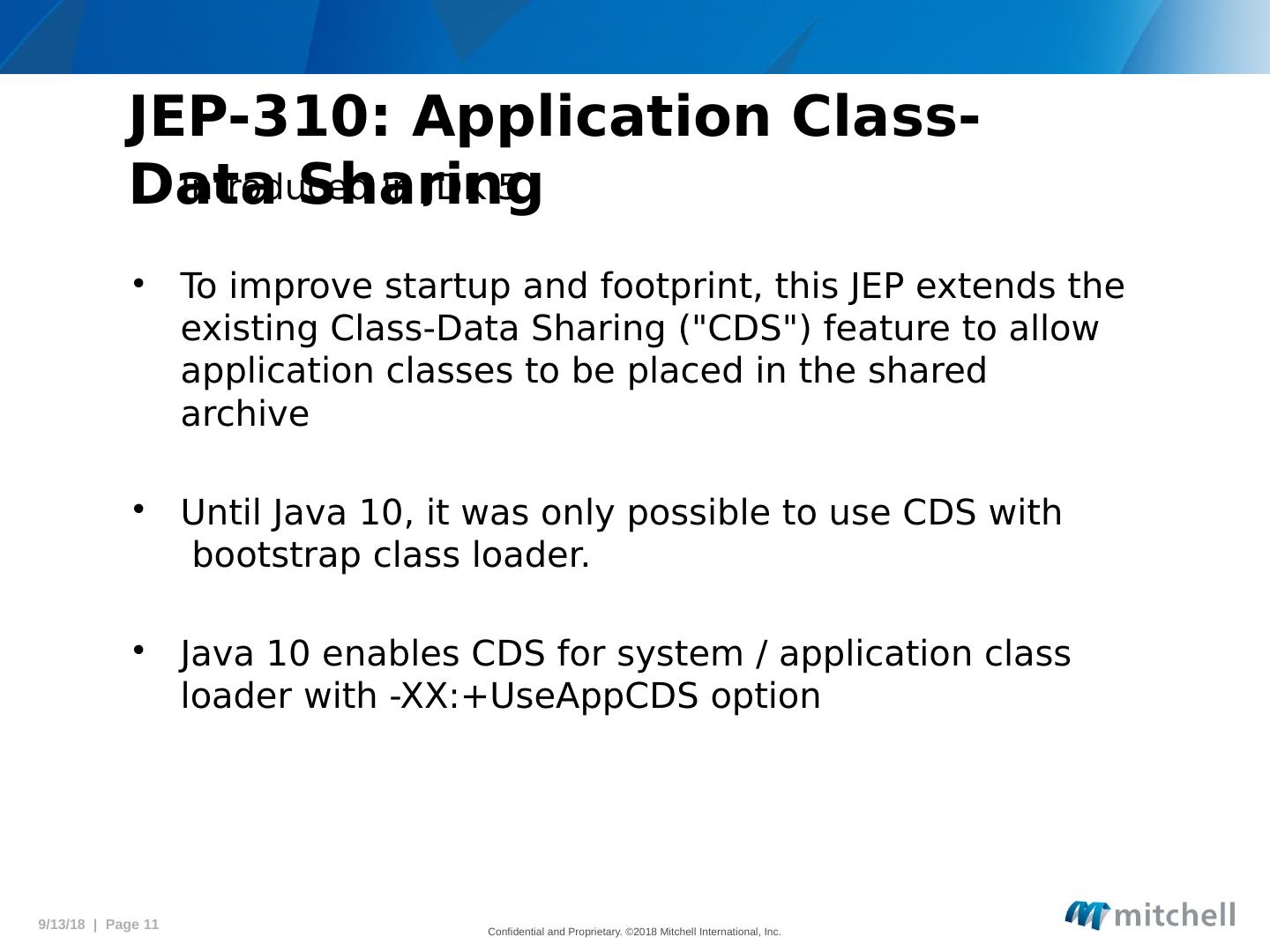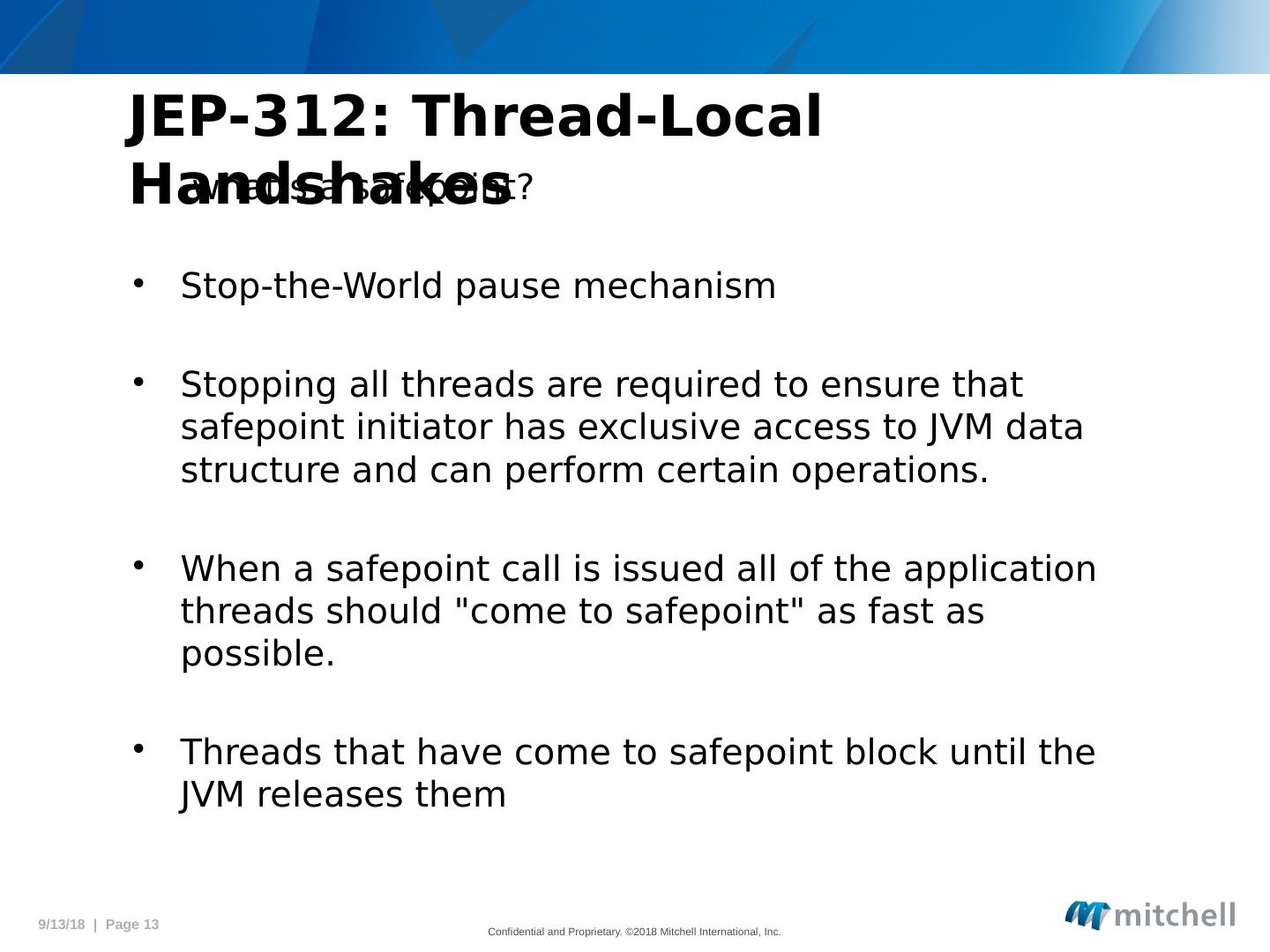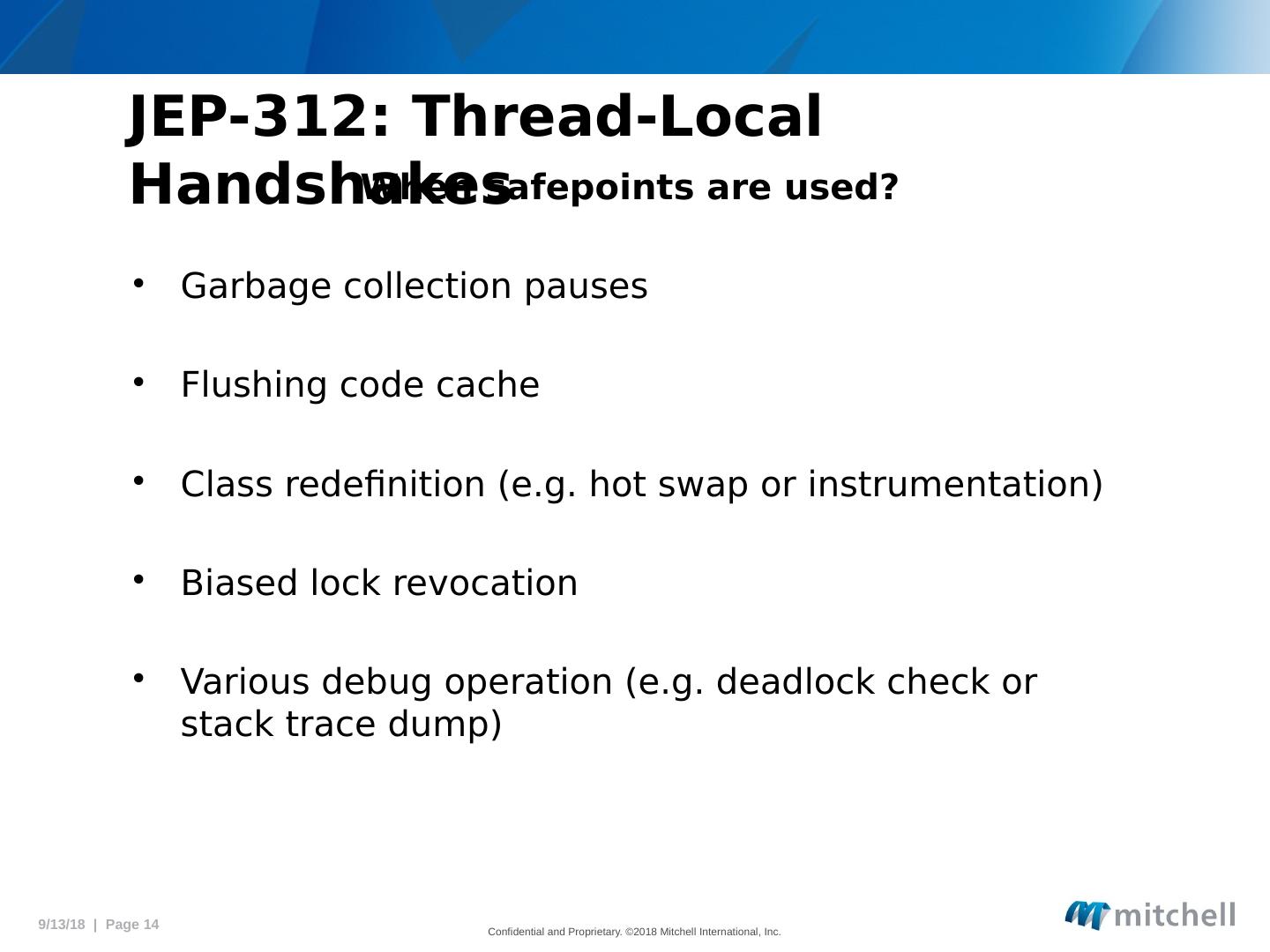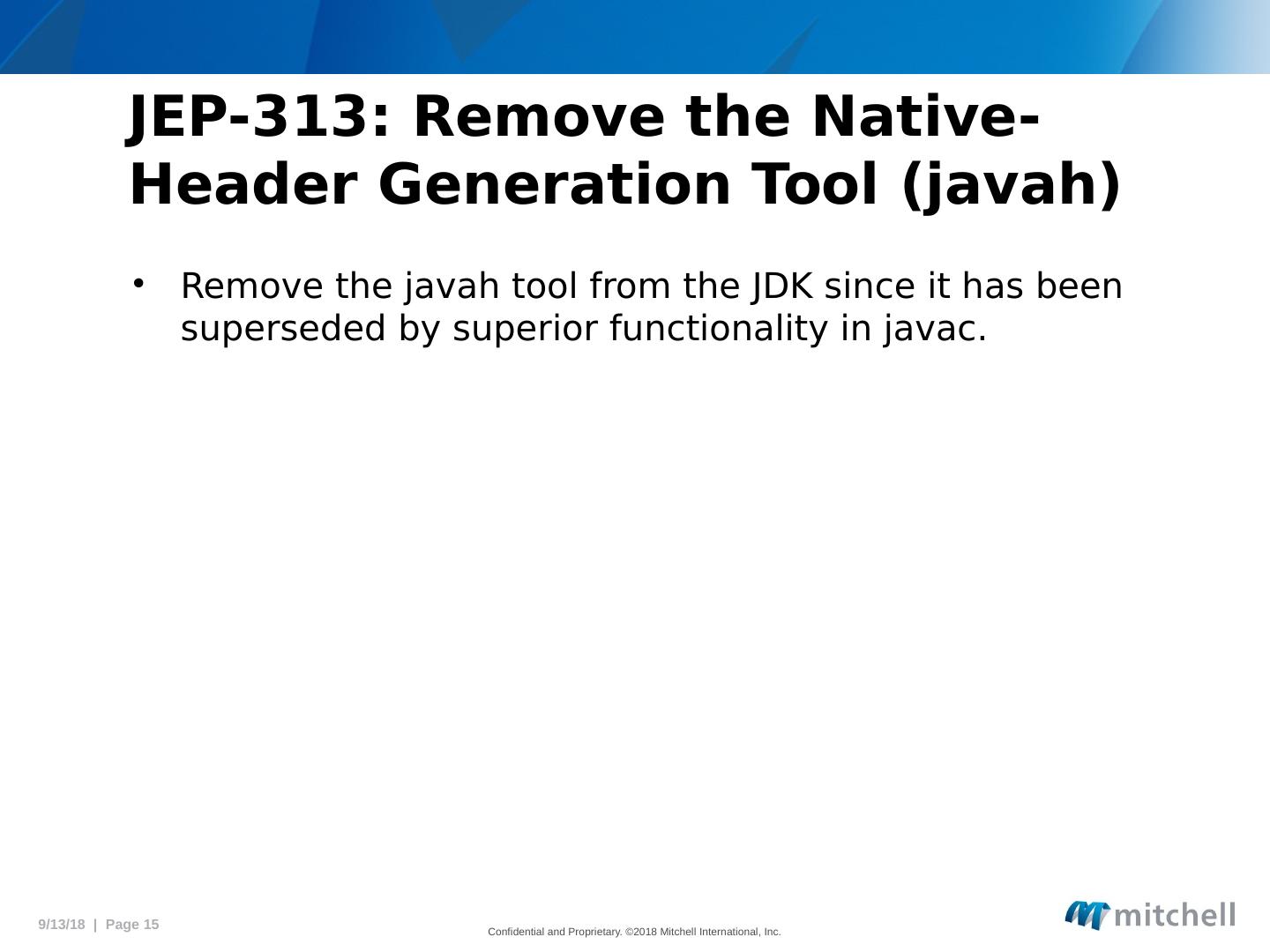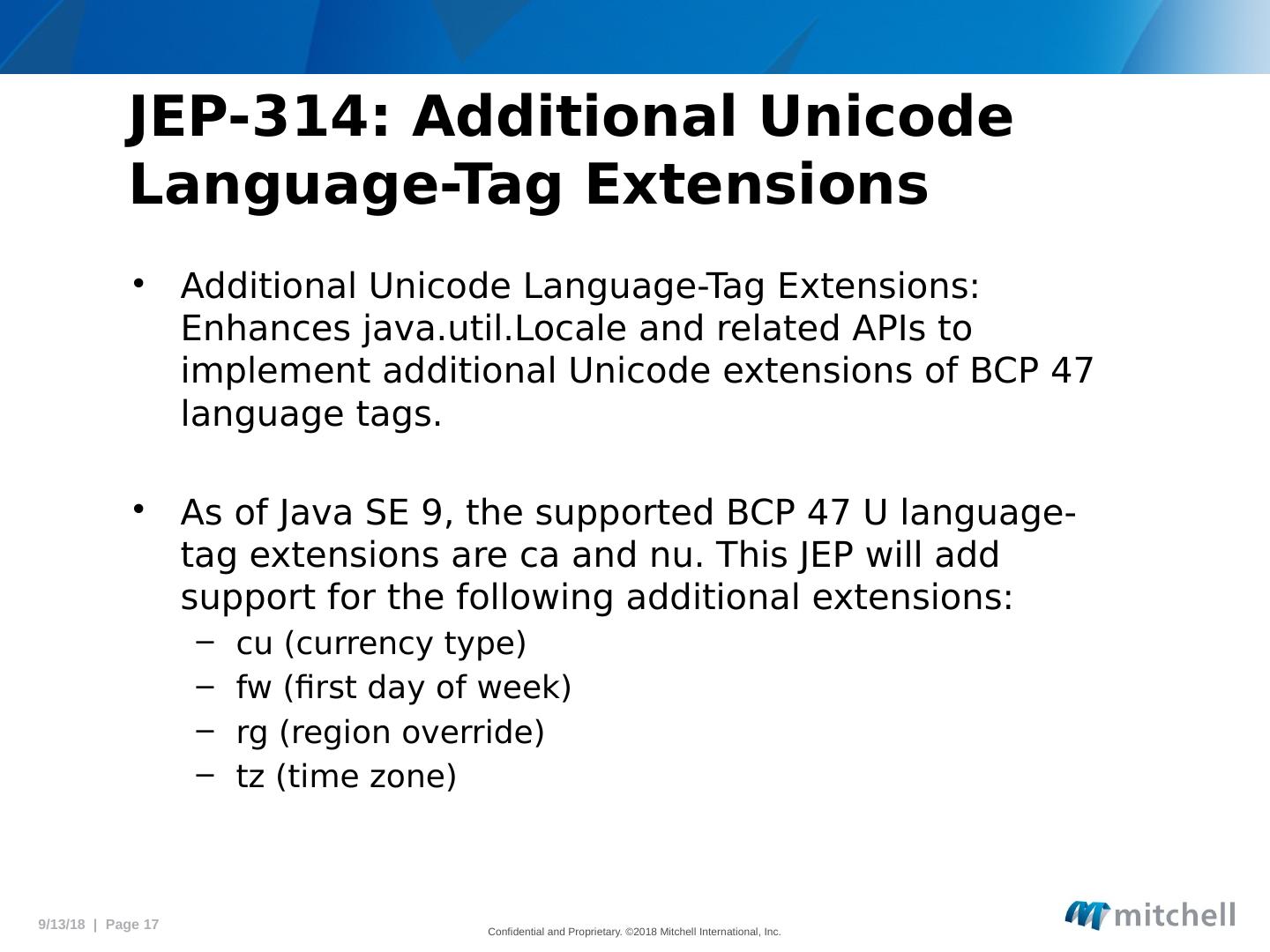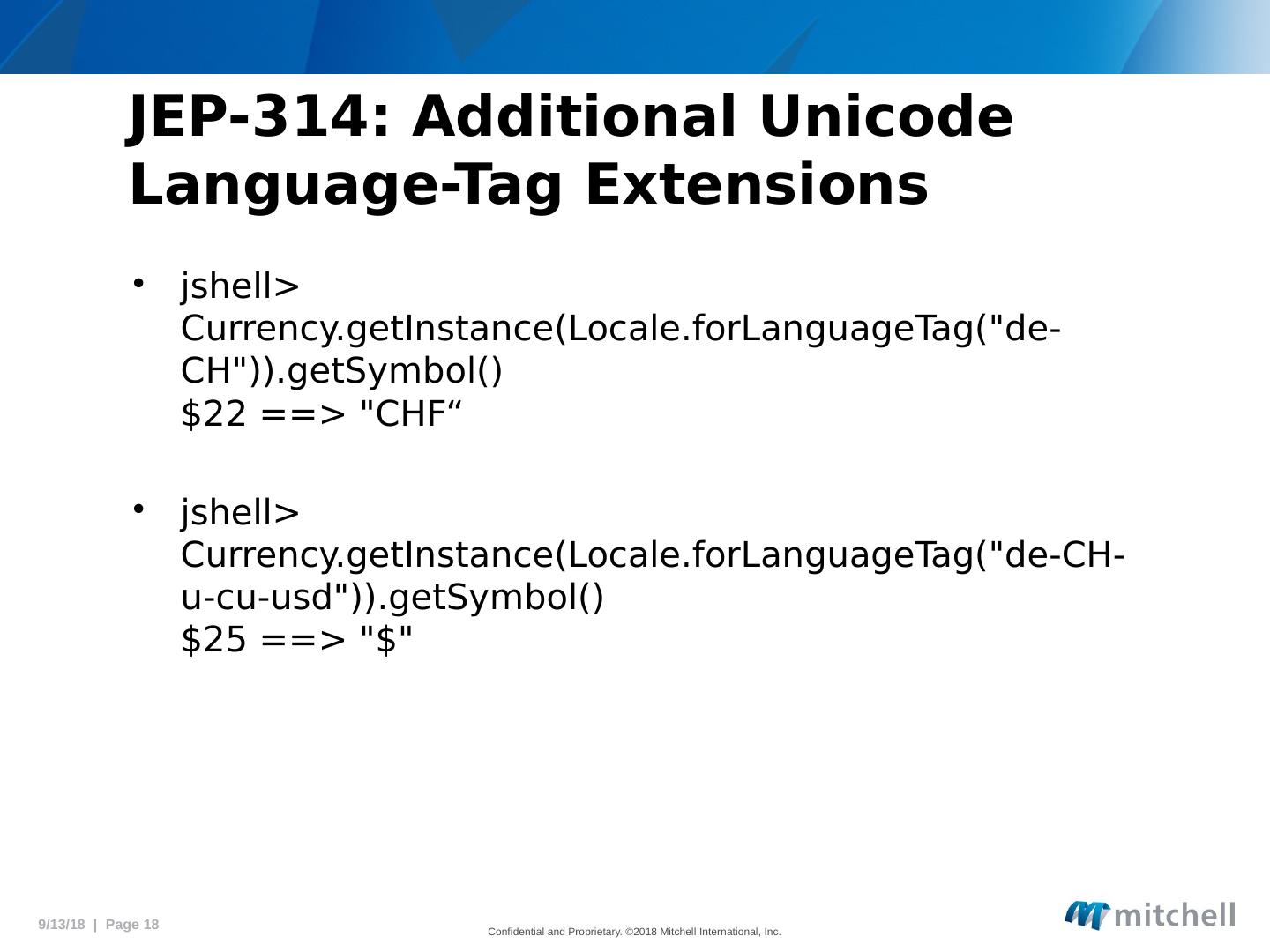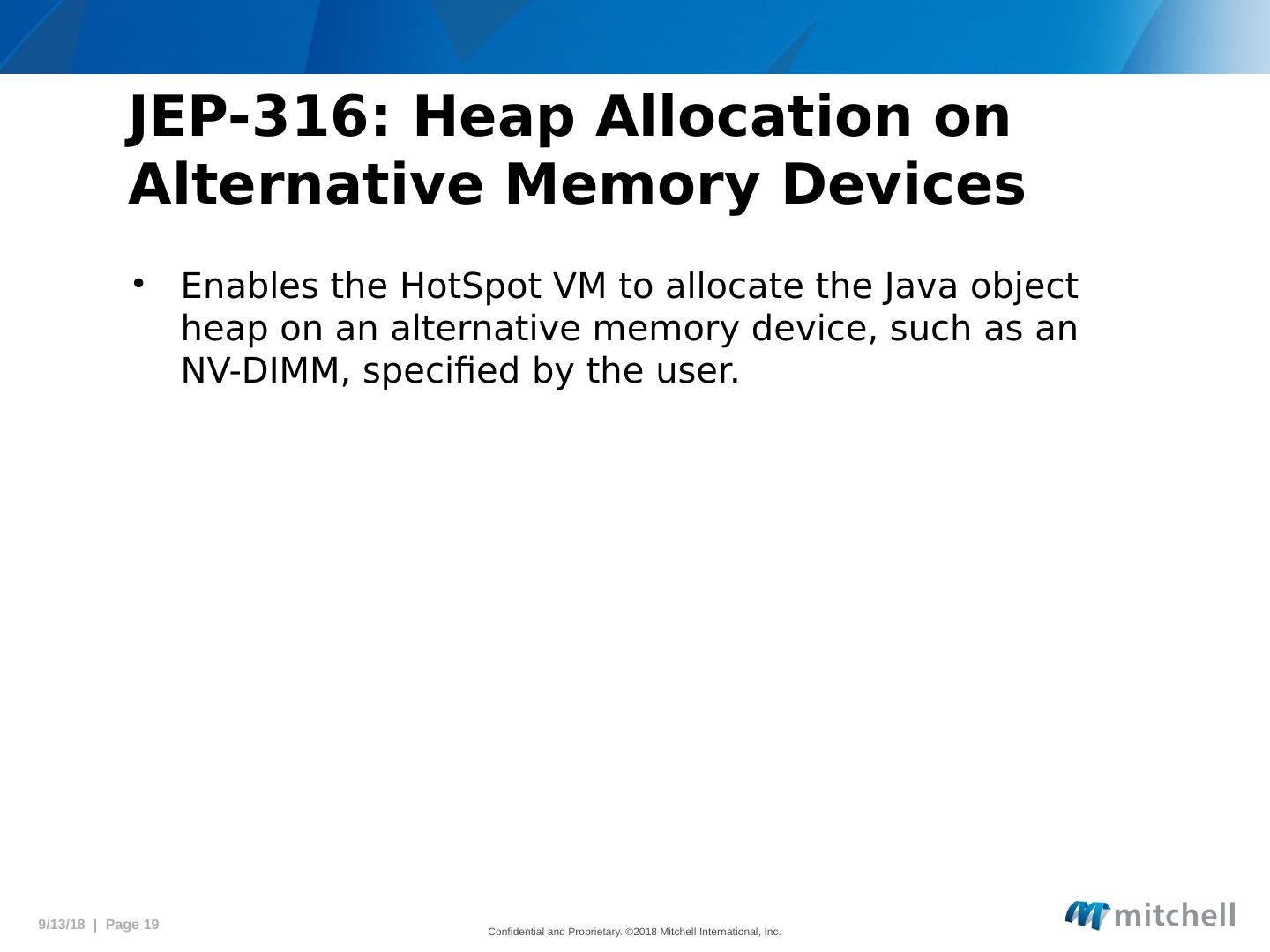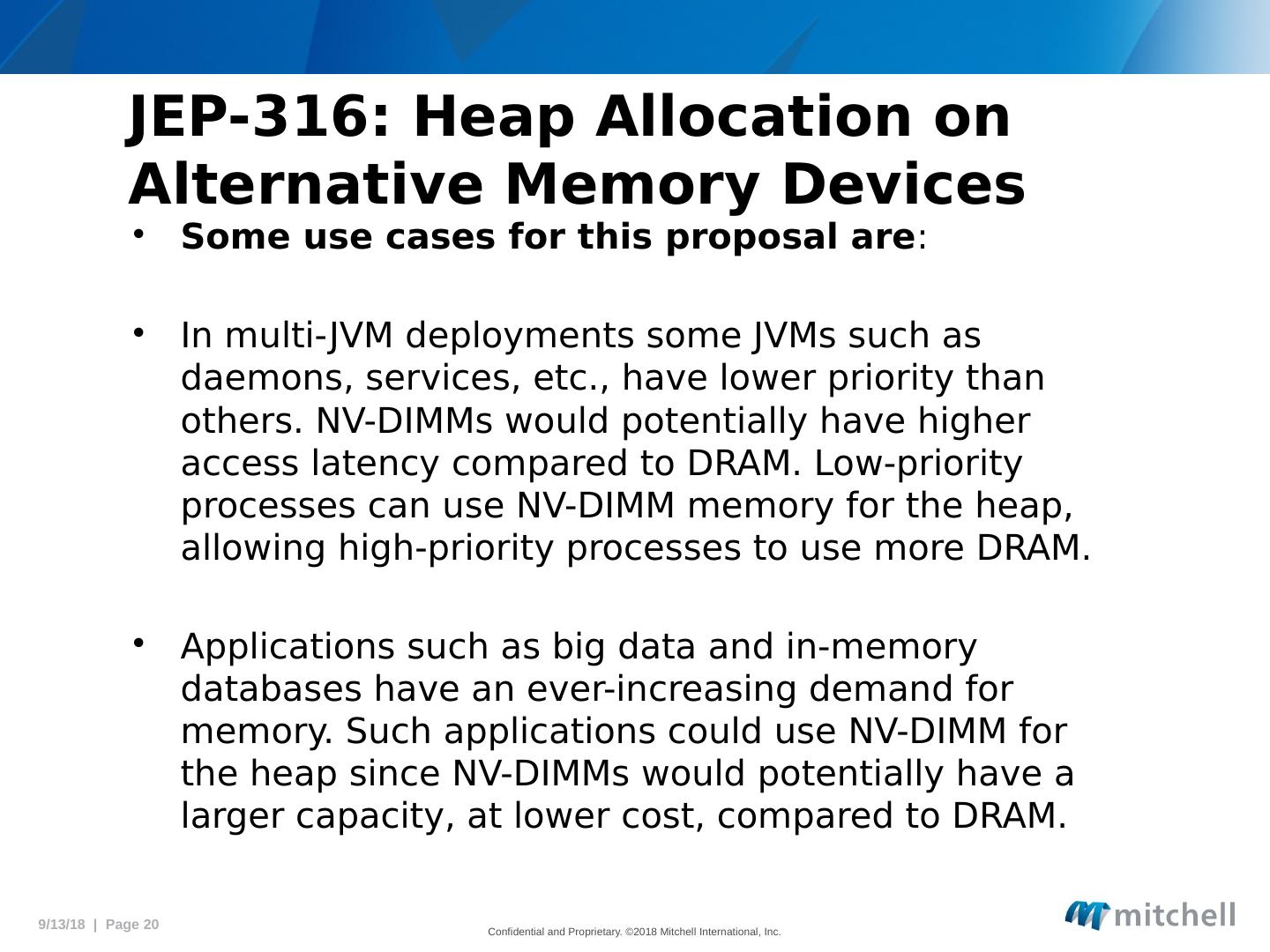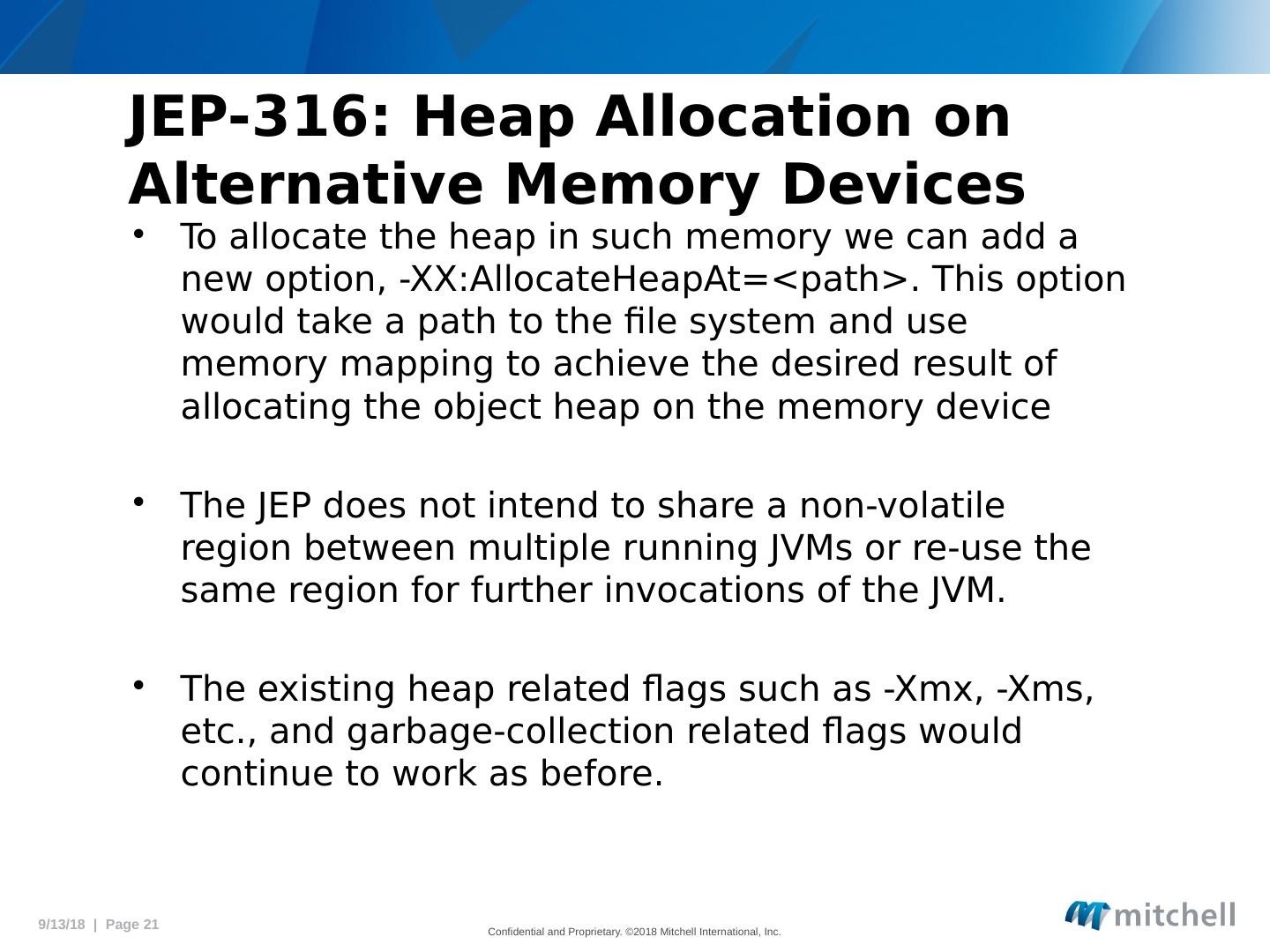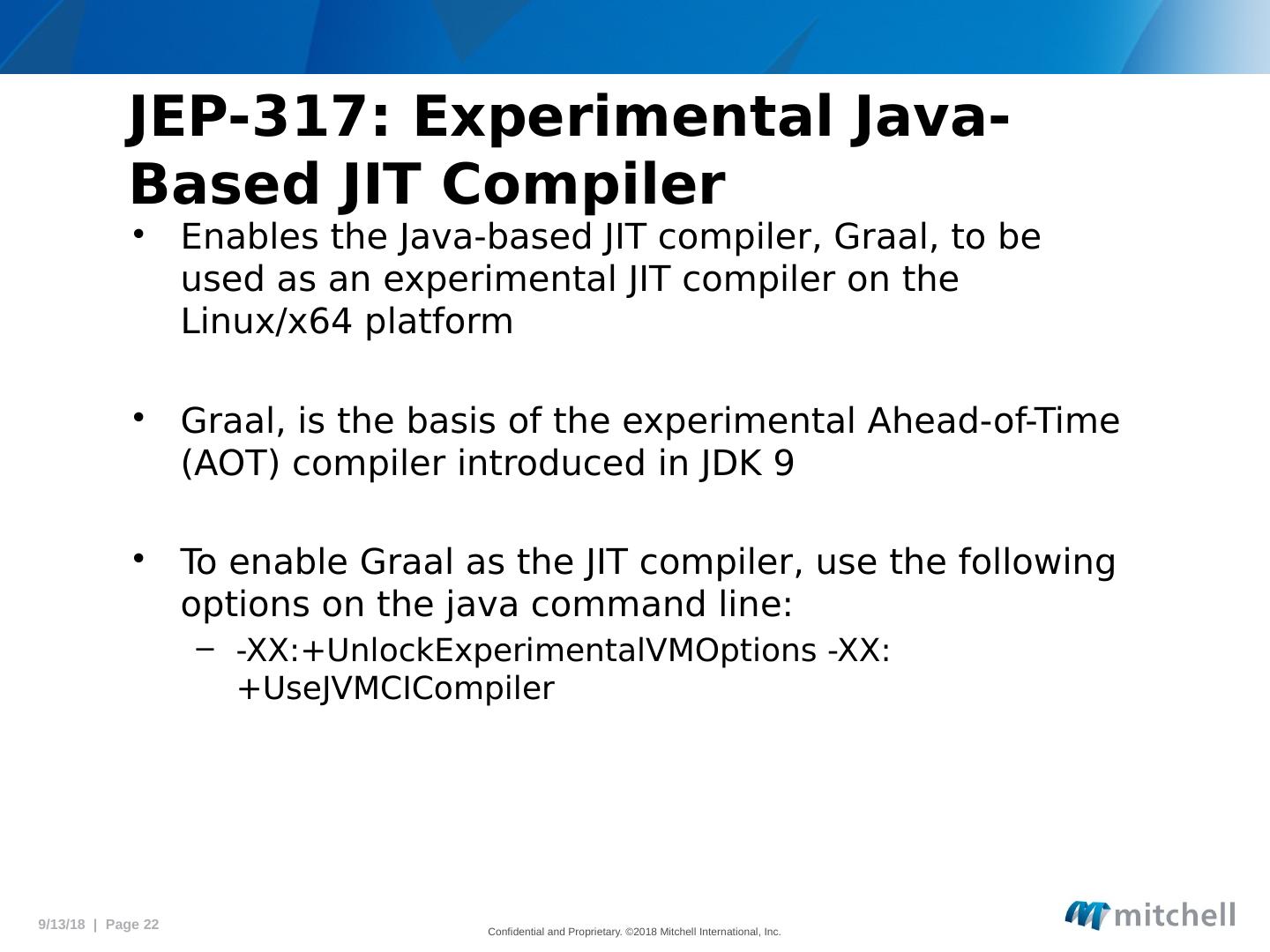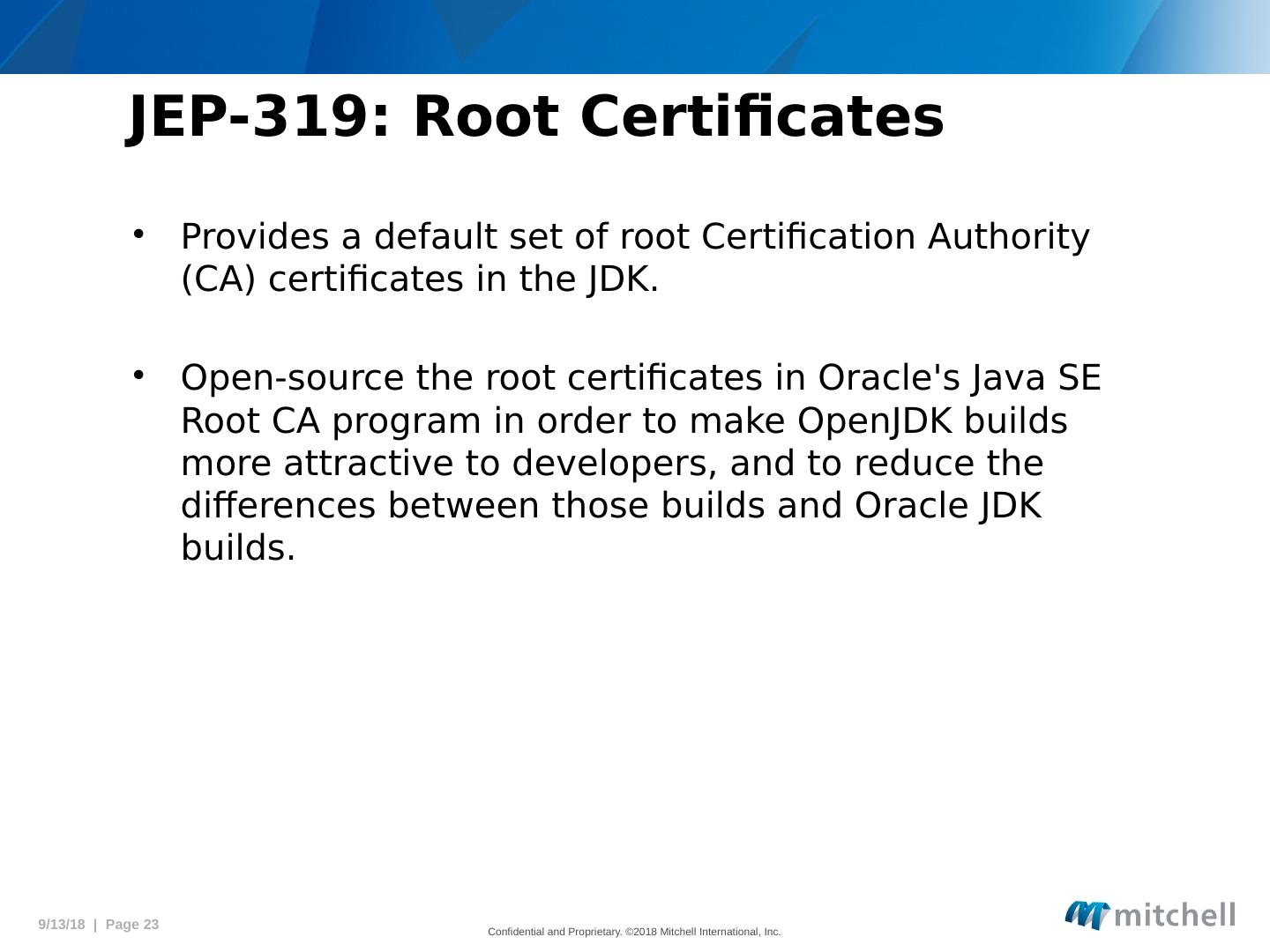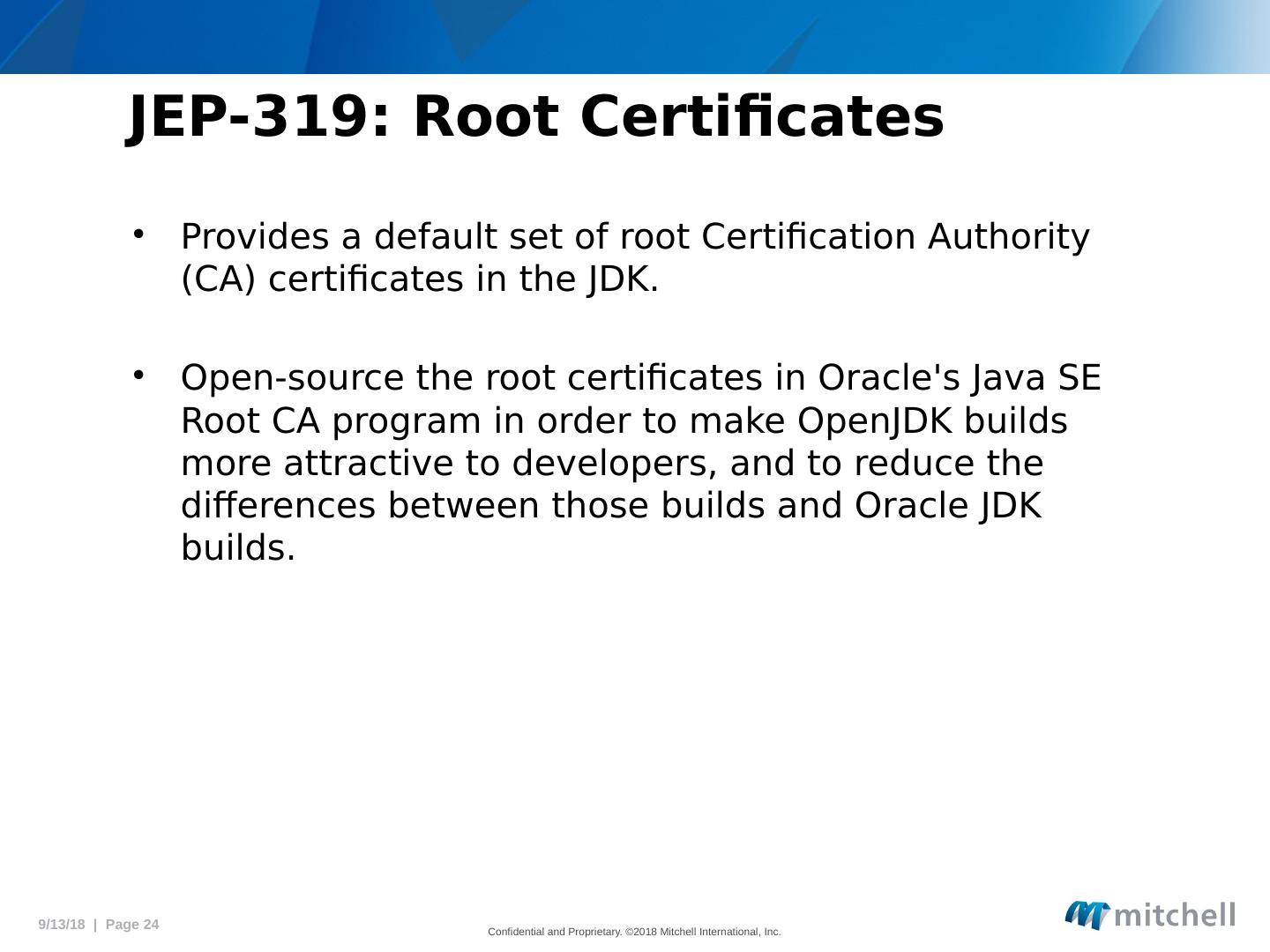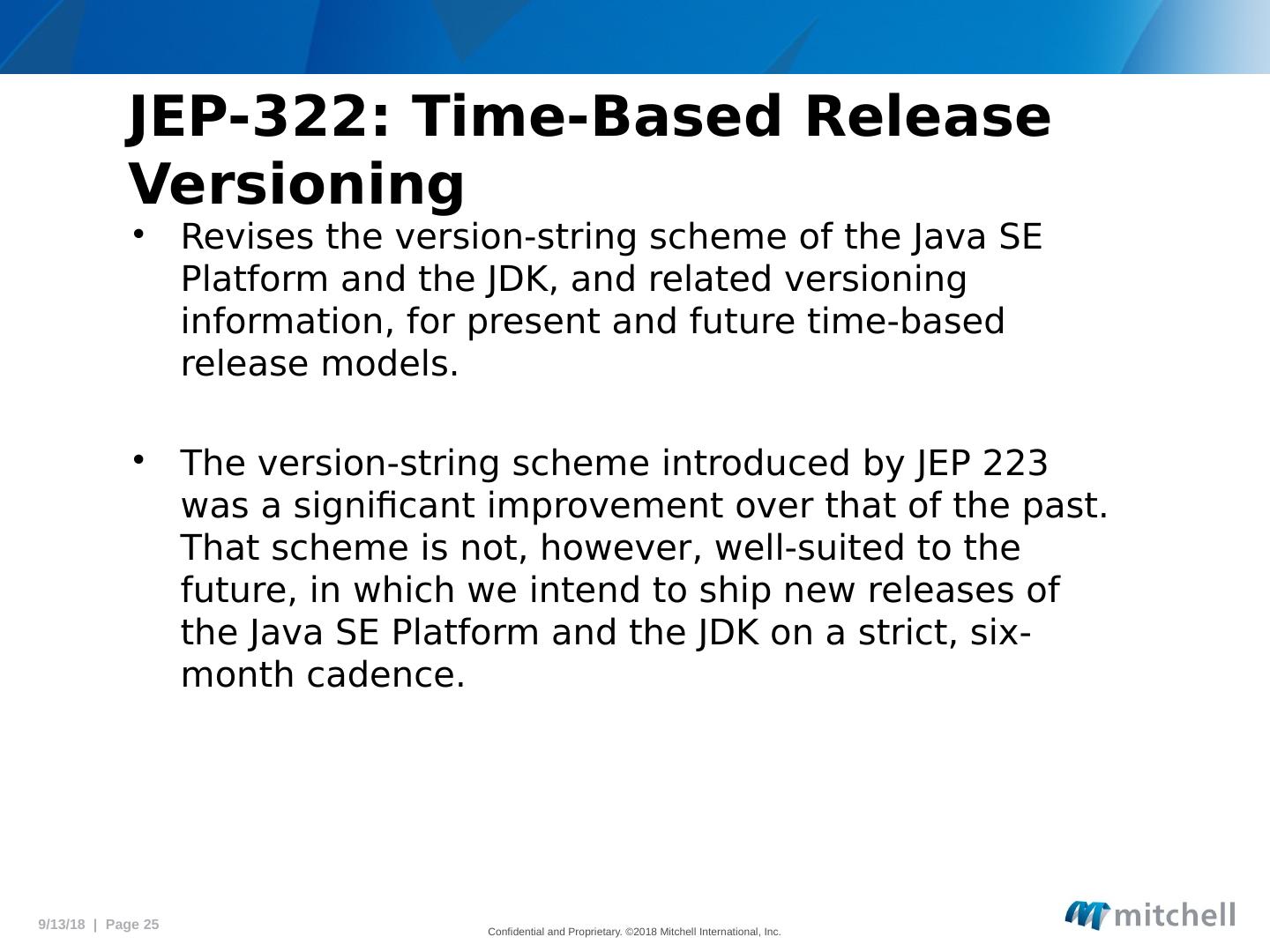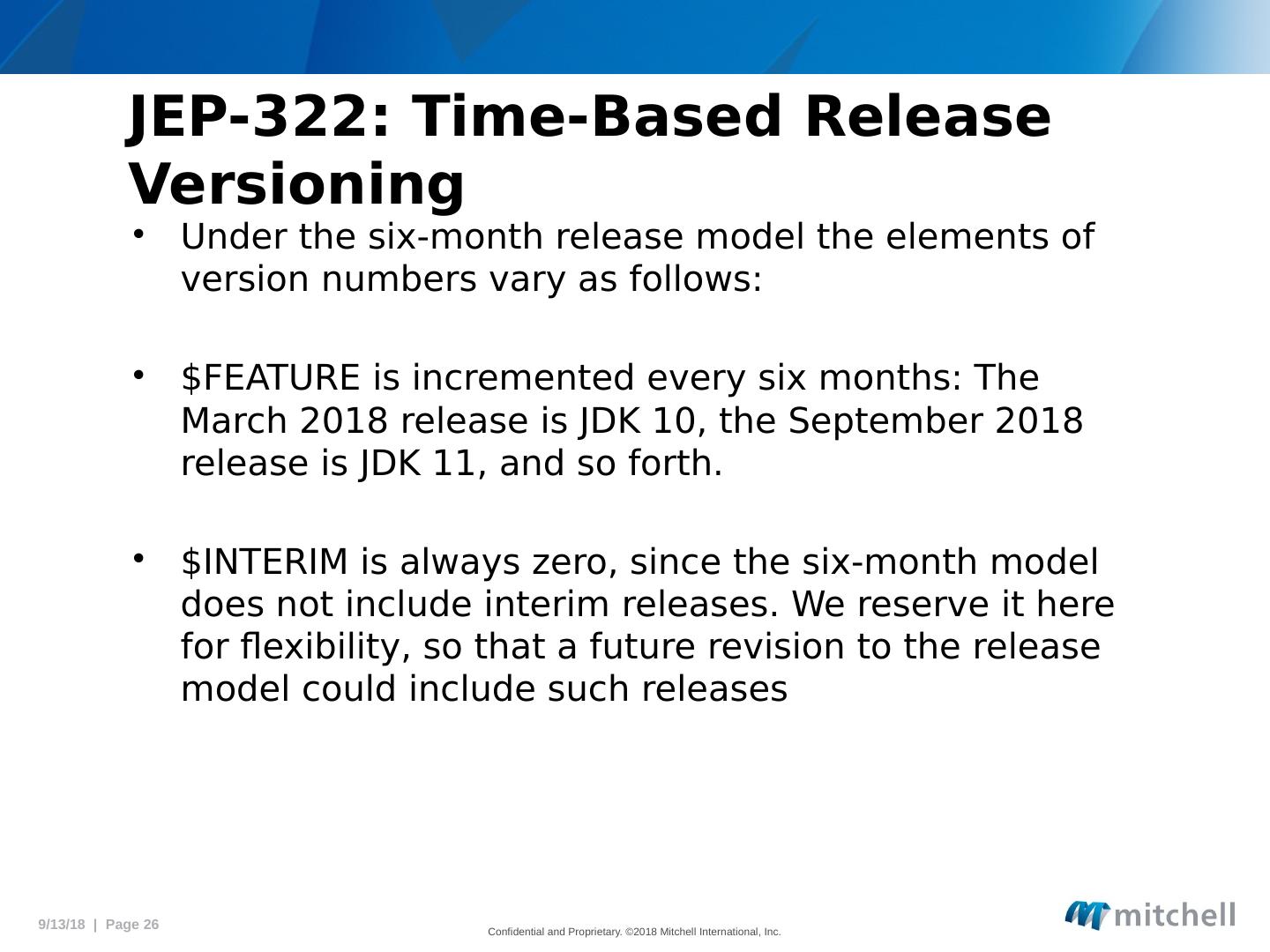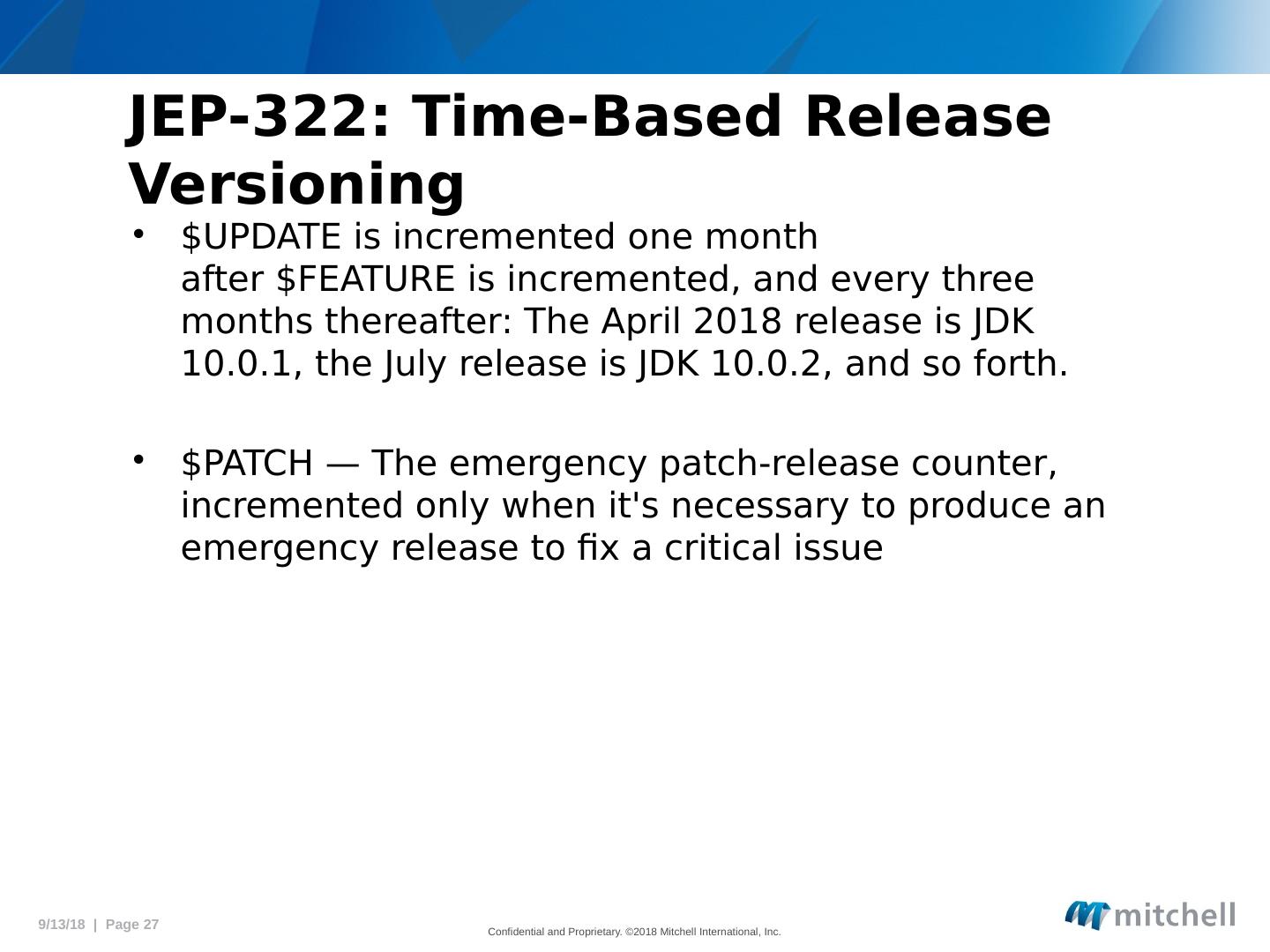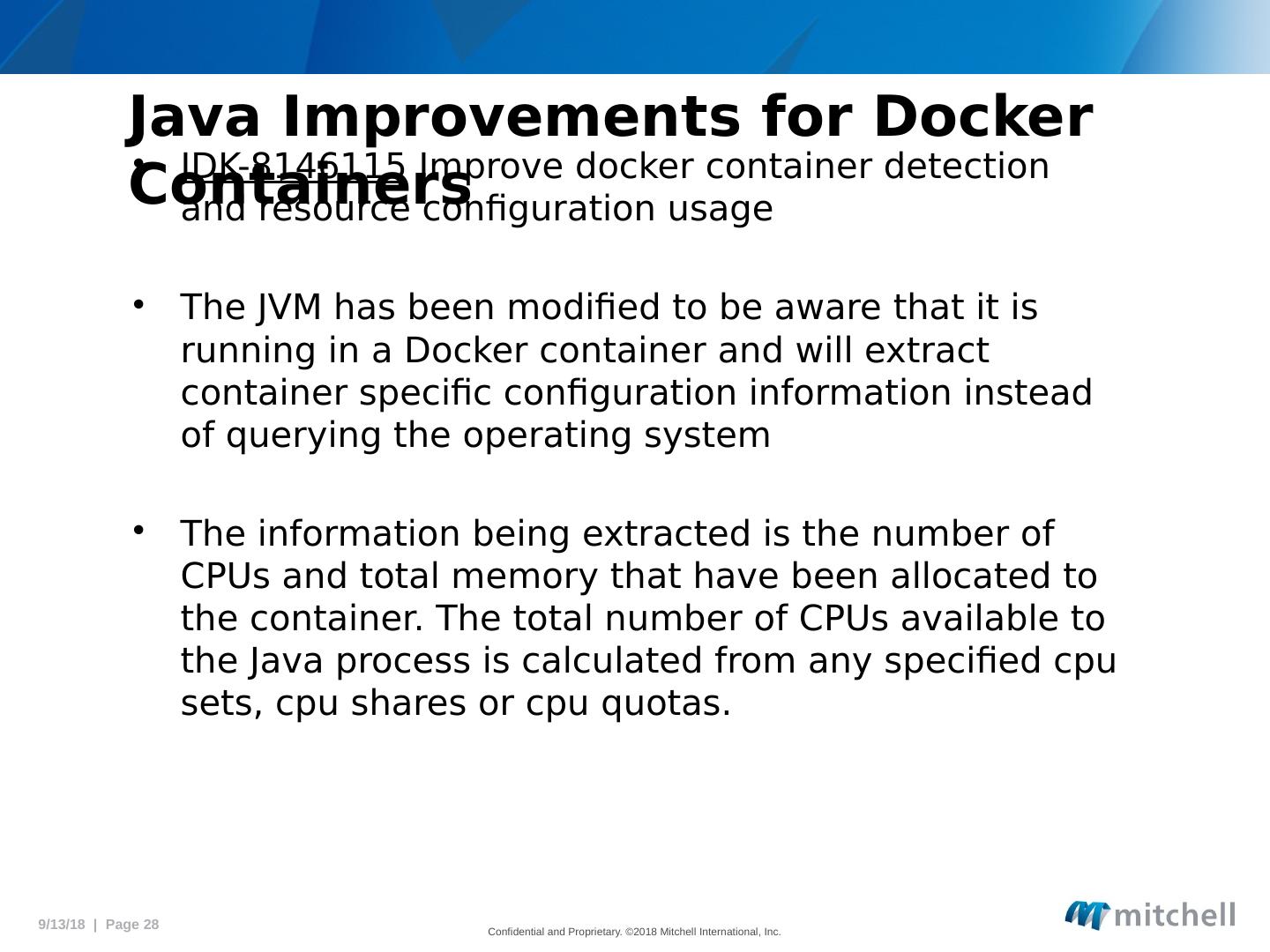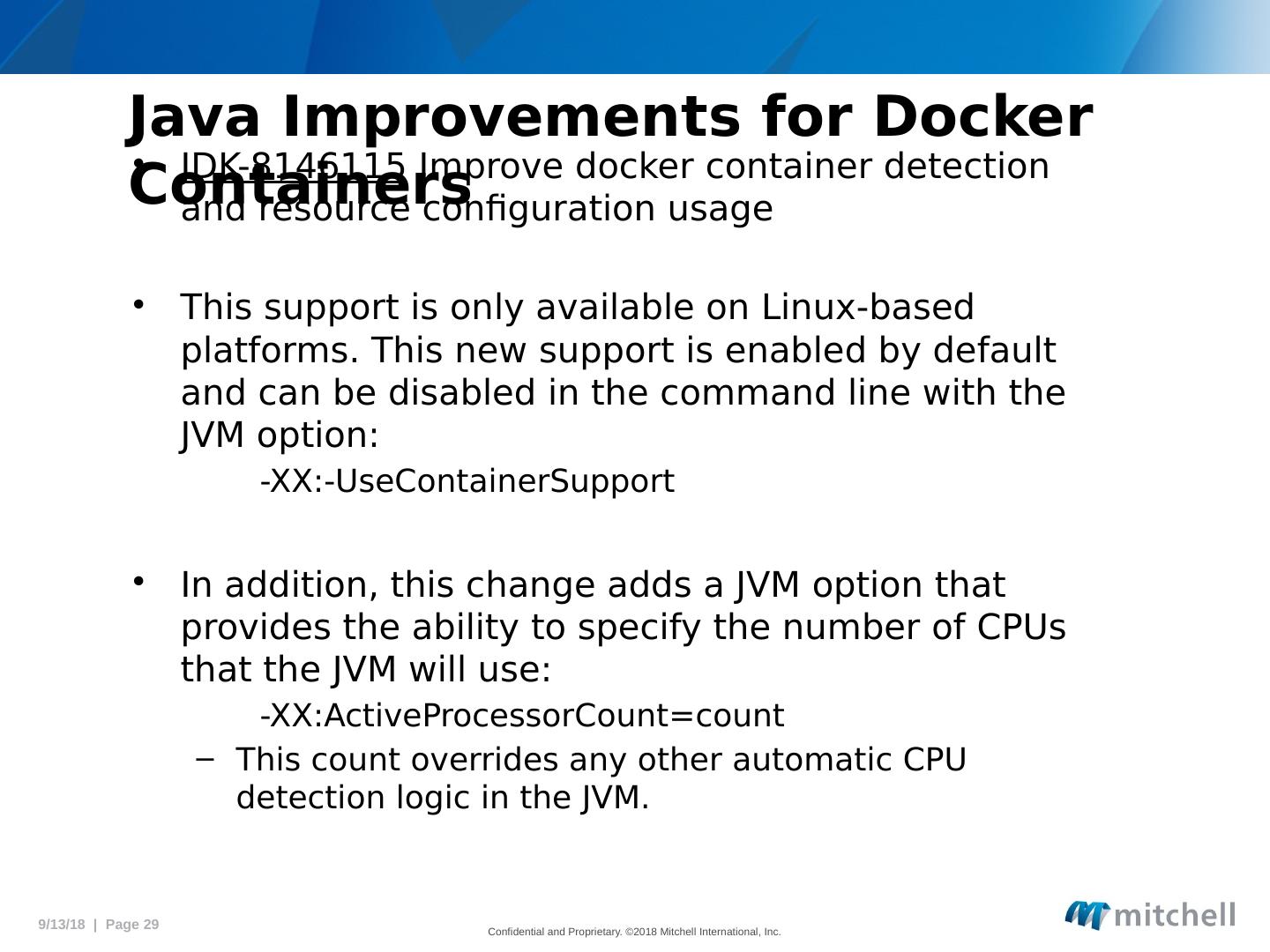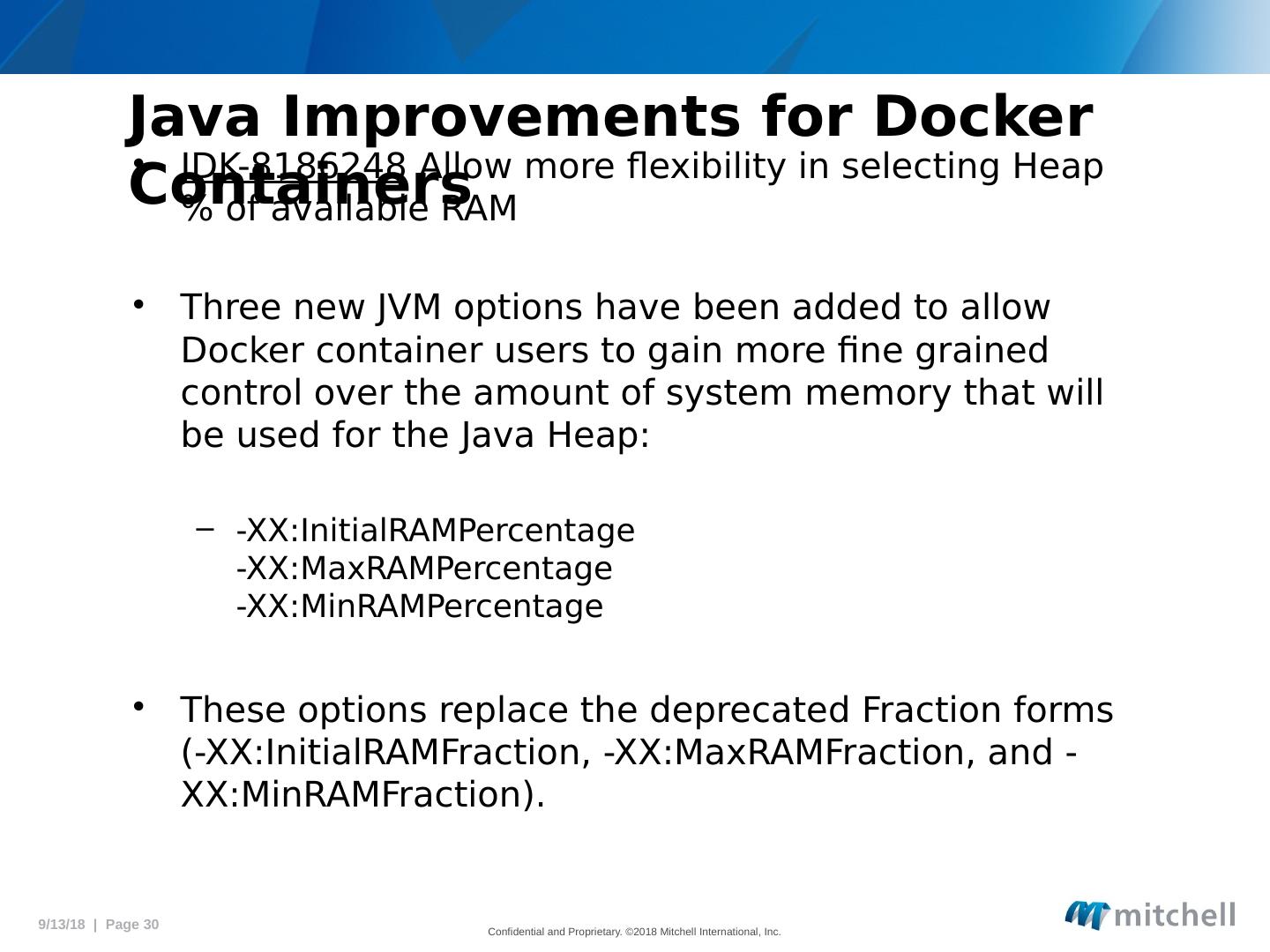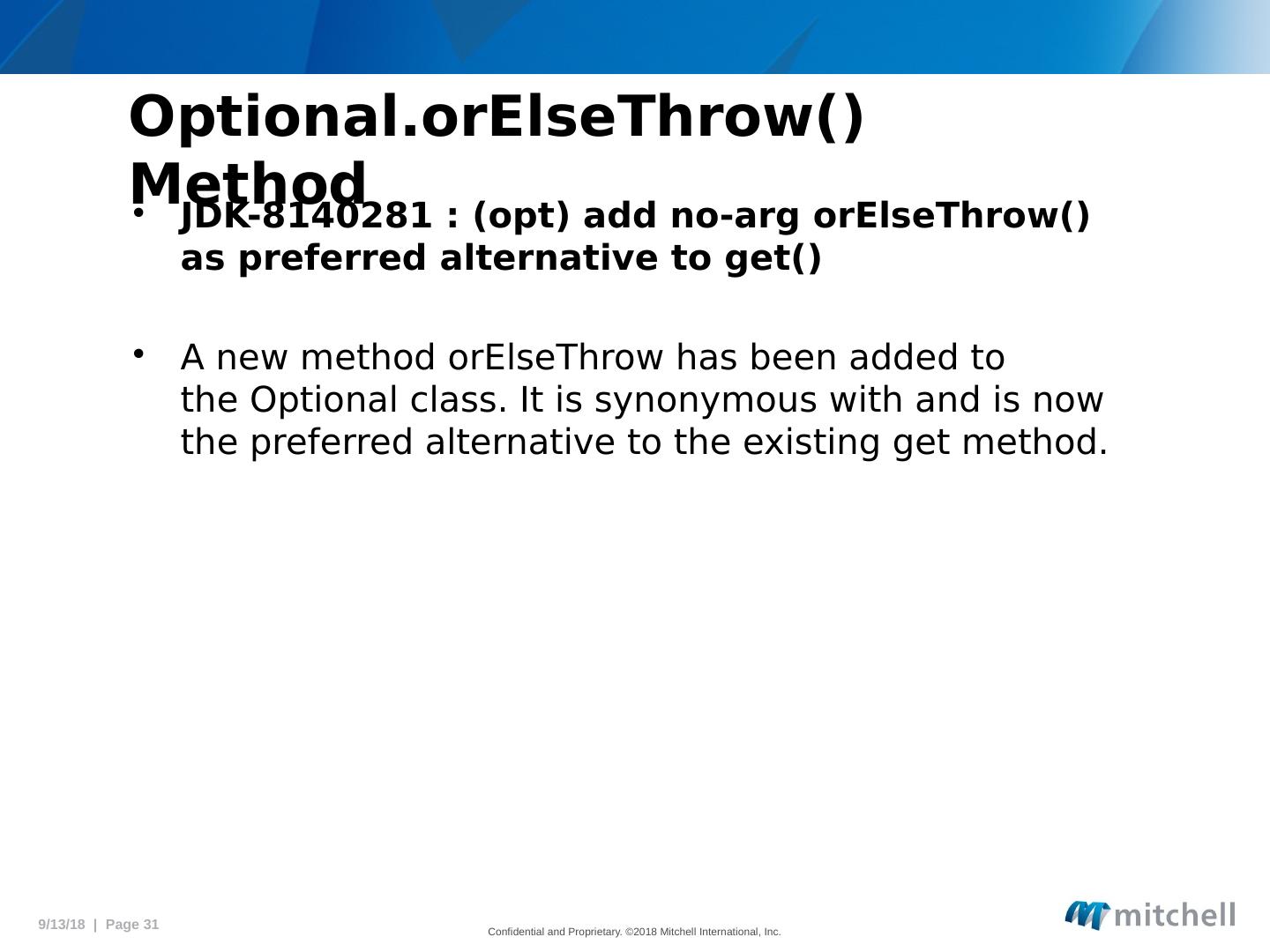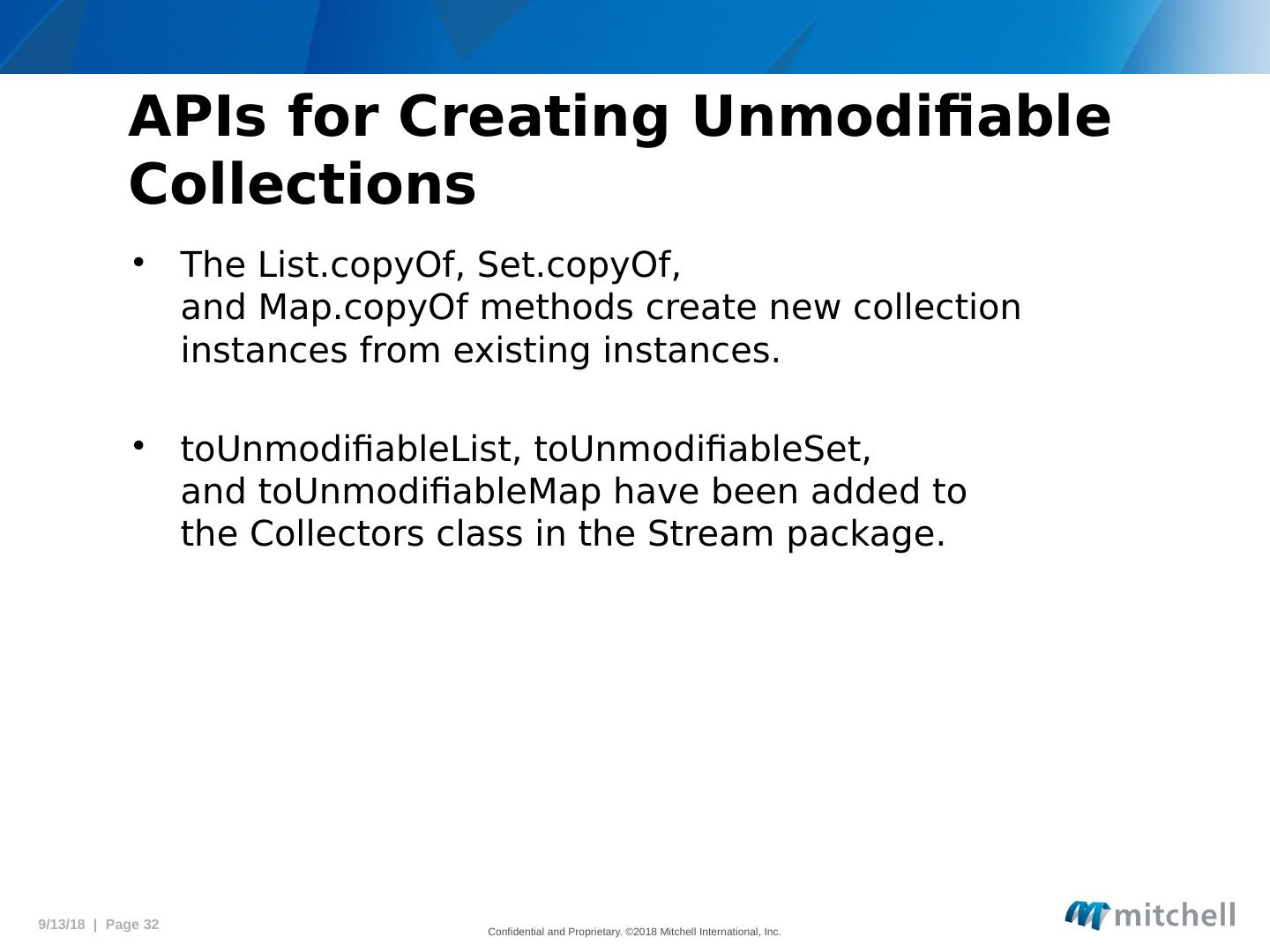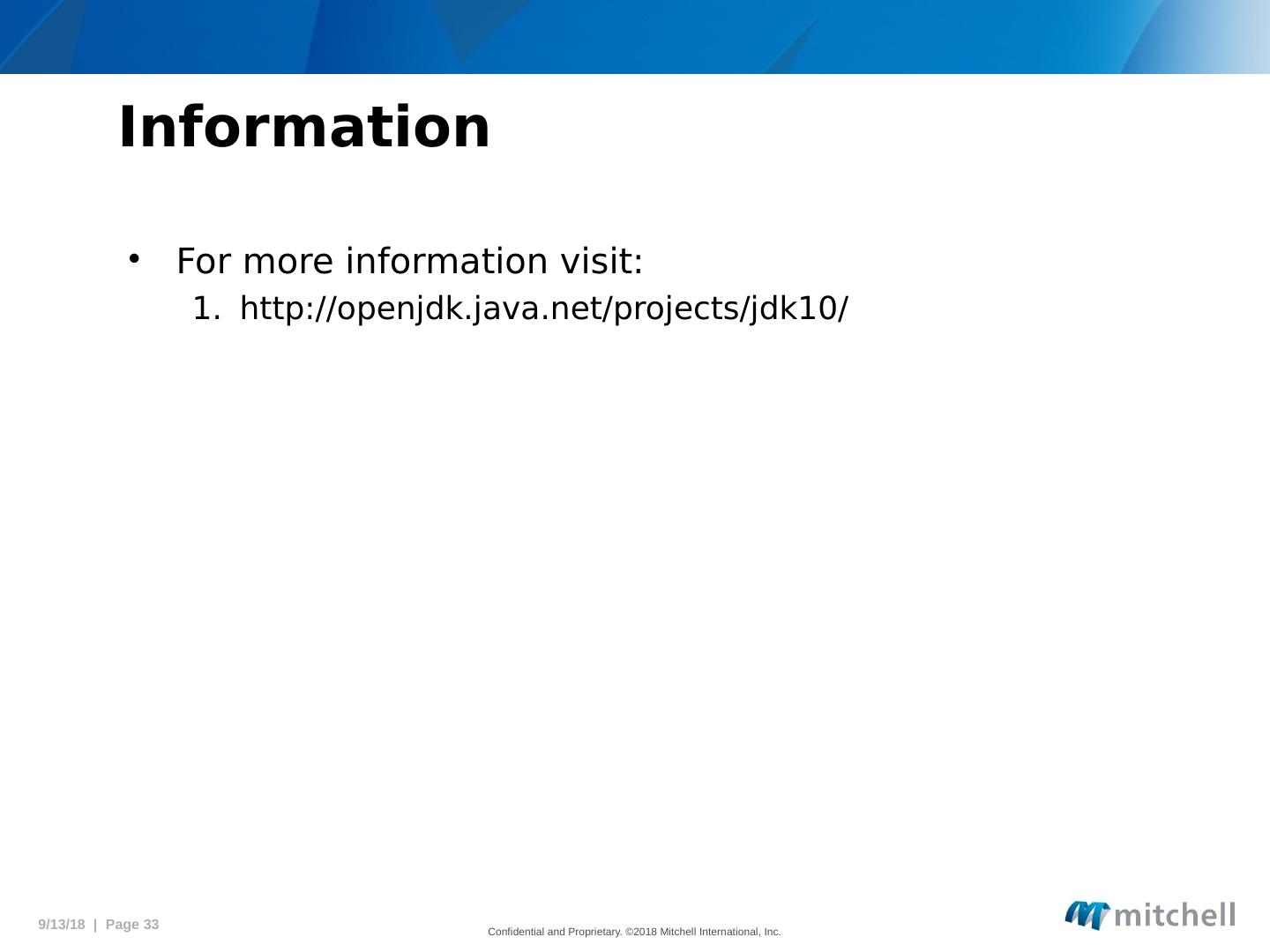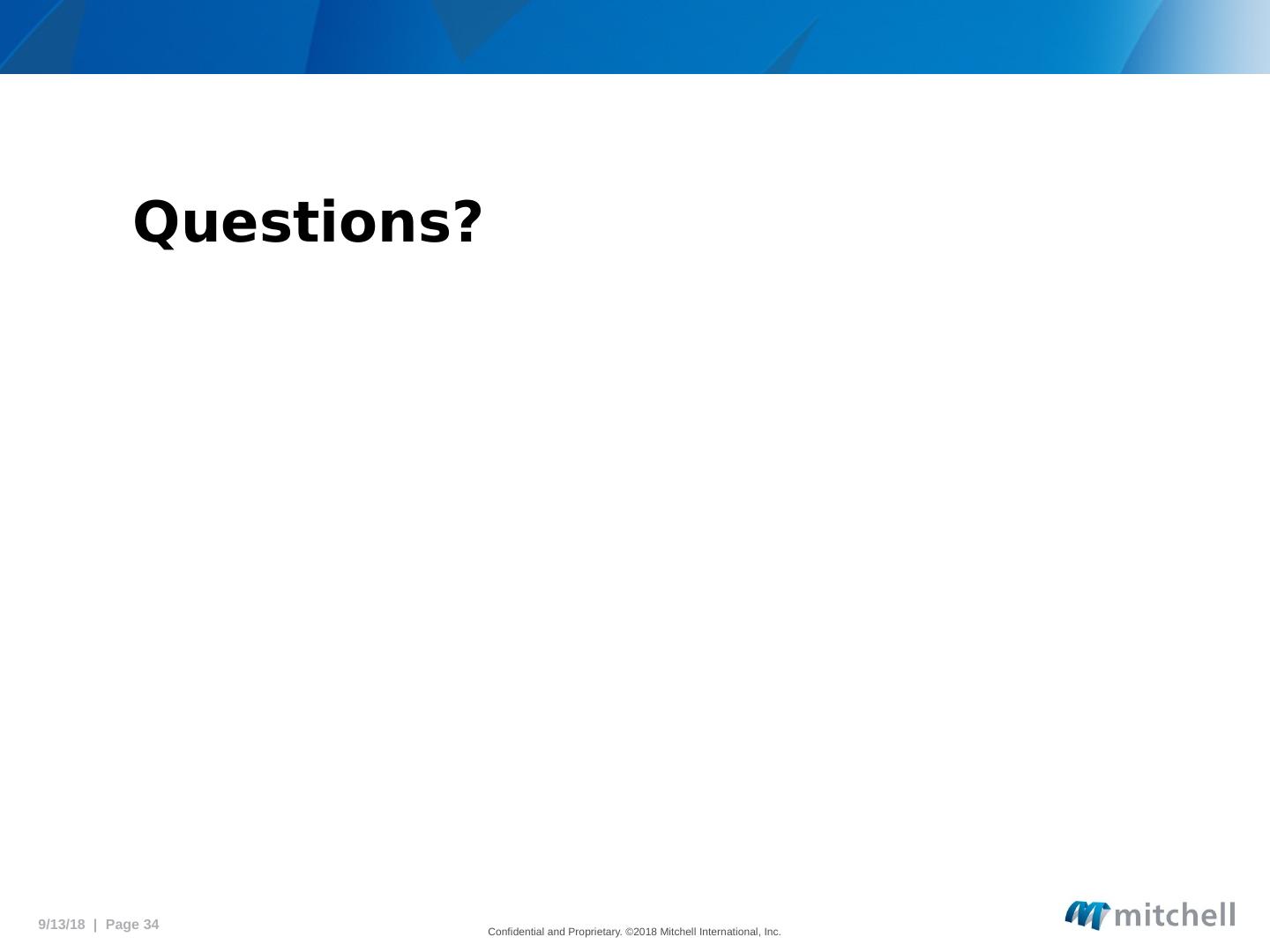- 快召唤伙伴们来围观吧
- 微博 QQ QQ空间 贴吧
- 文档嵌入链接
- <iframe src="https://www.slidestalk.com/u70/what_is_new_in_Java10?embed" frame border="0" width="640" height="360" scrolling="no" allowfullscreen="true">复制
- 微信扫一扫分享
What is New In Java 10
展开查看详情
1 .Java 10–changes to JDK 10. Jose Marcano , Sr. Software Engineer, May 15, 2018
2 .Java biggest changes Java 5 generics Java 7 GC1/NIO. Java 8 Lambdas/Streams Java 9 Modules. 5/15/2018 | Page 2
3 .JEP and JSR Definition JEP JDK Enhancement Proposal JSR Java Specification Request 5/15/2018 | Page 3
4 .Java 10 changes JEP-286: Local-Variable Type Inference JEP-296: Consolidate the JDK Forest into a Single Repository JEP-304: Garbage-Collector Interface JEP-307: Parallel Full GC for G1 JEP-310: Application Class-Data Sharing JEP-312: Thread-Local Handshakes JEP-313: Remove the Native-Header Generation Tool ( javah ) JEP-314: Additional Unicode Language-Tag Extensions JEP-316: Heap Allocation on Alternative Memory Devices JEP-317: Experimental Java-Based JIT Compiler JEP-319: Root Certificates JEP-322: Time-Based Release Versioning 5/15/2018 | Page 4
5 .JEP-286 var Local variable type inference, to enhance the Java language to extend type inference to declarations of local variables with initializers. Before Java 10: List<String> list = new ArrayList <String>(); URL url = new URL("http://www.oracle.com/"); URLConnection conn = url.openConnection (); Reader reader = new BufferedReader ( new InputStreamReader ( conn.getInputStream ())); Java 10: var list = new ArrayList <String>(); var url = new URL("http://www.oracle.com/"); var conn = url.openConnection (); var reader = new BufferedReader ( new InputStreamReader ( conn.getInputStream ())); 5/15/2018 | Page 5
6 .JEP-286 var Local variable type inference, to enhance the Java language to extend type inference to declarations of local variables with initializers. List<String> list = new ArrayList <>(); To var list = new ArrayList <>(); Is list a List<String> ? No it is a List<Object> 5/15/2018 | Page 6
7 .JEP-286 var The var will be restricted to: Local variables with initializers Indexes in the enhanced for-loop Locals declared in a traditional for-loop It will not be available for: Method parameters Constructor parameters Method return types Fields Catch formals (or any other kind of variable declaration) 5/15/2018 | Page 7
8 .JEP-296: Consolidate the JDK Forest into a Single Repository In JDK 9 there are eight repos: root, corba , hotspot, jaxp , jaxws , jdk , langtools , and nashorn . The idea is to combine many repositories of the JDK forest into a single repository to simplify development. 5/15/2018 | Page 8
9 .JEP-304: Garbage-Collector Interface Improve the source code isolation of different garbage collectors by introducing a clean garbage collector (GC) interface Better modularity for HotSpot internal GC code Make it simpler to add a new GC to HotSpot without perturbing the current code base Make it easier to exclude a GC from a JDK build 5/15/2018 | Page 9
10 .JEP-307: Parallel Full GC for G1 G1 became the default garbage collector in JDK 9. Its design tries to avoid full GC G1 only uses a single-threaded mark-sweep-compact algorithm to perform a full collection The previous default, the parallel collector, has a parallel full GC To minimize the impact for users experiencing full GCs, the G1 full GC should be made parallel as well The number of threads can be controlled by the - XX:ParallelGCThreads option Improve G1 worst-case latencies 5/15/2018 | Page 10
11 .JEP-310: Application Class-Data Sharing Introduced in JDK 5 To improve startup and footprint, this JEP extends the existing Class-Data Sharing ("CDS") feature to allow application classes to be placed in the shared archive Until Java 10, it was only possible to use CDS with bootstrap class loader. Java 10 enables CDS for system / application class loader with -XX:+ UseAppCDS option 5/15/2018 | Page 11
12 .JEP-312: Thread-Local Handshakes Introduce a way to execute a callback on threads without performing a global VM safepoint Makes it both possible and cheap to stop individual threads and not just all threads or none. A handshake operation is a callback that is executed for each JavaThread while that thread is in a safepoint safe state Thread-local handshakes will be implemented initially on x64 and SPARC. Other platforms will fall back to normal safepoints . 5/15/2018 | Page 12
13 .JEP-312: Thread-Local Handshakes what’s a safepoint ? Stop-the-World pause mechanism Stopping all threads are required to ensure that safepoint initiator has exclusive access to JVM data structure and can perform certain operations. When a safepoint call is issued all of the application threads should "come to safepoint " as fast as possible. Threads that have come to safepoint block until the JVM releases them 5/15/2018 | Page 13
14 .JEP-312: Thread-Local Handshakes When safepoints are used? Garbage collection pauses Flushing code cache Class redefinition (e.g. hot swap or instrumentation) Biased lock revocation Various debug operation (e.g. deadlock check or stack trace dump) 5/15/2018 | Page 14
15 .JEP-313: Remove the Native-Header Generation Tool ( javah ) Remove the javah tool from the JDK since it has been superseded by superior functionality in javac . 5/15/2018 | Page 15
16 .JEP-314: Additional Unicode Language-Tag Extensions Additional Unicode Language-Tag Extensions: Enhances java.util.Locale and related APIs to implement additional Unicode extensions of BCP 47 language tags. As of Java SE 9, the supported BCP 47 U language-tag extensions are ca and nu. This JEP will add support for the following additional extensions: cu (currency type) fw (first day of week) rg (region override) tz (time zone) 5/15/2018 | Page 16
17 .JEP-314: Additional Unicode Language-Tag Extensions Additional Unicode Language-Tag Extensions: Enhances java.util.Locale and related APIs to implement additional Unicode extensions of BCP 47 language tags. As of Java SE 9, the supported BCP 47 U language-tag extensions are ca and nu. This JEP will add support for the following additional extensions: cu (currency type) fw (first day of week) rg (region override) tz (time zone) 5/15/2018 | Page 17
18 .JEP-314: Additional Unicode Language-Tag Extensions jshell > Currency.getInstance ( Locale.forLanguageTag ("de-CH")). getSymbol () $22 ==> "CHF“ jshell > Currency.getInstance ( Locale.forLanguageTag ("de-CH-u-cu- usd ")). getSymbol () $25 ==> "$" 5/15/2018 | Page 18
19 .JEP-316: Heap Allocation on Alternative Memory Devices Enables the HotSpot VM to allocate the Java object heap on an alternative memory device, such as an NV-DIMM, specified by the user. 5/15/2018 | Page 19
20 .JEP-316: Heap Allocation on Alternative Memory Devices Some use cases for this proposal are : In multi-JVM deployments some JVMs such as daemons, services, etc., have lower priority than others. NV-DIMMs would potentially have higher access latency compared to DRAM. Low-priority processes can use NV-DIMM memory for the heap, allowing high-priority processes to use more DRAM. Applications such as big data and in-memory databases have an ever-increasing demand for memory. Such applications could use NV-DIMM for the heap since NV-DIMMs would potentially have a larger capacity, at lower cost, compared to DRAM. 5/15/2018 | Page 20
21 .JEP-316: Heap Allocation on Alternative Memory Devices To allocate the heap in such memory we can add a new option, - XX:AllocateHeapAt =<path>. This option would take a path to the file system and use memory mapping to achieve the desired result of allocating the object heap on the memory device The JEP does not intend to share a non-volatile region between multiple running JVMs or re-use the same region for further invocations of the JVM. The existing heap related flags such as - Xmx , - Xms , etc., and garbage-collection related flags would continue to work as before. 5/15/2018 | Page 21
22 .JEP-317: Experimental Java-Based JIT Compiler Enables the Java-based JIT compiler, Graal , to be used as an experimental JIT compiler on the Linux/x64 platform Graal , is the basis of the experimental Ahead-of-Time (AOT) compiler introduced in JDK 9 To enable Graal as the JIT compiler, use the following options on the java command line: -XX:+ UnlockExperimentalVMOptions -XX:+ UseJVMCICompiler 5/15/2018 | Page 22
23 .JEP-317: Experimental Java-Based JIT Compiler Enables the Java-based JIT compiler, Graal , to be used as an experimental JIT compiler on the Linux/x64 platform Graal , is the basis of the experimental Ahead-of-Time (AOT) compiler introduced in JDK 9 To enable Graal as the JIT compiler, use the following options on the java command line: -XX:+ UnlockExperimentalVMOptions -XX:+ UseJVMCICompiler 5/15/2018 | Page 22
24 .JEP-317: Experimental Java-Based JIT Compiler Enables the Java-based JIT compiler, Graal , to be used as an experimental JIT compiler on the Linux/x64 platform Graal , is the basis of the experimental Ahead-of-Time (AOT) compiler introduced in JDK 9 To enable Graal as the JIT compiler, use the following options on the java command line: -XX:+ UnlockExperimentalVMOptions -XX:+ UseJVMCICompiler 5/15/2018 | Page 22
25 .JEP-322: Time-Based Release Versioning Revises the version-string scheme of the Java SE Platform and the JDK, and related versioning information, for present and future time-based release models. The version-string scheme introduced by JEP 223 was a significant improvement over that of the past. That scheme is not, however, well-suited to the future, in which we intend to ship new releases of the Java SE Platform and the JDK on a strict, six-month cadence. 5/15/2018 | Page 25
26 .JEP-322: Time-Based Release Versioning Under the six-month release model the elements of version numbers vary as follows: $FEATURE is incremented every six months: The March 2018 release is JDK 10, the September 2018 release is JDK 11, and so forth. $INTERIM is always zero, since the six-month model does not include interim releases. We reserve it here for flexibility, so that a future revision to the release model could include such releases 5/15/2018 | Page 26
27 .JEP-322: Time-Based Release Versioning Under the six-month release model the elements of version numbers vary as follows: $FEATURE is incremented every six months: The March 2018 release is JDK 10, the September 2018 release is JDK 11, and so forth. $INTERIM is always zero, since the six-month model does not include interim releases. We reserve it here for flexibility, so that a future revision to the release model could include such releases 5/15/2018 | Page 26
28 .Java Improvements for Docker Containers JDK-8146115 Improve docker container detection and resource configuration usage The JVM has been modified to be aware that it is running in a Docker container and will extract container specific configuration information instead of querying the operating system The information being extracted is the number of CPUs and total memory that have been allocated to the container. The total number of CPUs available to the Java process is calculated from any specified cpu sets, cpu shares or cpu quotas. 5/15/2018 | Page 28
29 .Java Improvements for Docker Containers JDK-8146115 Improve docker container detection and resource configuration usage This support is only available on Linux-based platforms. This new support is enabled by default and can be disabled in the command line with the JVM option: -XX:- UseContainerSupport In addition, this change adds a JVM option that provides the ability to specify the number of CPUs that the JVM will use: - XX:ActiveProcessorCount =count This count overrides any other automatic CPU detection logic in the JVM. 5/15/2018 | Page 29
















